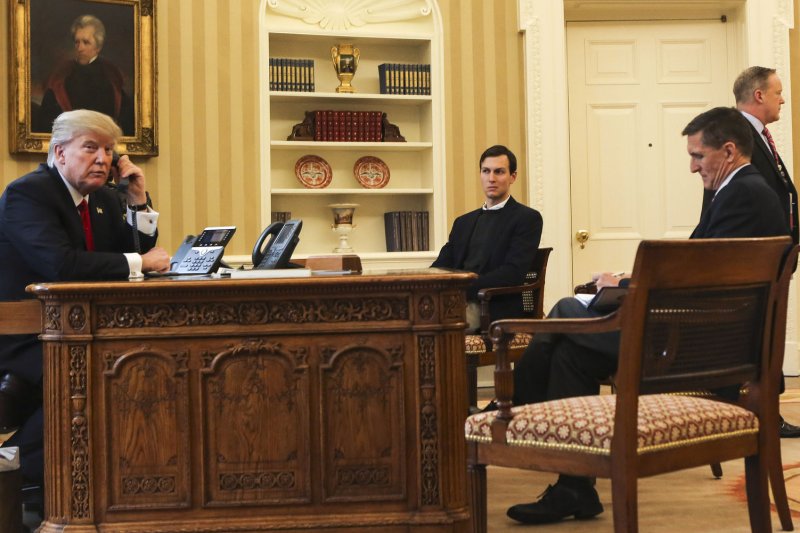U.S. President Donald Trump speaks with the King of Saudi Arabia, Salman bin Abd al-Aziz Al Saud, in the Oval Office of the White House surrounded by Senior Adviser to the President Jared Kushner (C), and Security Advisor Michael Flynn (R), on Sunday. Pool Photo by Aude Guerrucci/UPI |
License Photo
LONDON -- After eight years of disappointment, frustration and empty rhetoric, Inauguration Day 2017 in the United States could not have come soon enough for some in the Gulf Cooperation Council. Gulf Arab leaders counted the seconds to see the end of the Obama administration, a presidency viewed by many in the region as a stab in the back.
Across the Gulf, official news agencies carried congratulatory messages, highlighting historic ties to the United States, coupled with statements seeking to boost relations. The optimistic diplomatic tone could not mask the reality, however, that relations suffered a significant setback during the eight years Barack Obama was in office.
Relations turned for the worst after the "Arab spring" protests in 2011, when Gulf Arab leaders viewed the U.S. government's abandonment of Egyptian President and longtime U.S .ally Hosni Mubarak as a betrayal. Abu Dhabi Crown Prince Sheikh Mohammed bin Zayed al-Nahyan labeled Obama "untrustworthy."
As far as Saudi Arabia was concerned, the Mubarak issue was just the beginning.
Riyadh and its intelligence community were reportedly shocked to learn that the United States had secret negotiations with archrival Iran, talks that led to the 2015 nuclear deal in exchange for sanctions relief. Despite the obligatory public endorsement of the deal by Saudi and GCC officials, behind closed doors the fear was that lifting the sanctions would empower the Islamic Republic to continue its destabilizing regional activities.
Obama's lack of engagement in Syria, which resulted in the resurgence of Russia as a regional power for the first time since the Afghan war and led to the survival of the Iran-allied regime of Syrian President Bashar al-Assad, further alienated traditional U.S. allies.
During a Jan. 24 news conference with French Foreign Minister Jean-Marc Ayrault in Riyadh, Saudi Foreign Minister Adel al-Jubeir said the kingdom looked forward to working with the Trump administration, which has indicated it would be more likely to try to contain Tehran. One of U.S. President Donald Trump's campaign vows was to rip up the nuclear deal or renegotiate its terms.
Jubeir said Trump has "spoken about containing Iran and its ability to cause mischief and making sure that Iran abides to the agreement that was signed." He emphasized that was also the kingdom's position.
The optimistic assessment continued as Jubeir lavished praise on some of the new U.S. president's Cabinet choices, including Secretary of State nominee Rex Tillerson, Defense Secretary James Mattis and CIA Director Mike Pompeo.
"These are very, very impressive individuals," Jubeir said. "They're highly capable. They're highly experienced and they have a very realistic and wise view of the world and America's role in it."
No tears were shed in the government-friendly GCC media over Obama's departure; however the unpredictable nature of the new U.S. president meant that many pundits were cautious.
Known for his staunch and sometimes overzealous defense of U.S. regional policy, particularly during the disastrous invasion of Iraq, Saudi commentator and former general manager of the Al Arabiya news channel Abdulrahman al-Rashed appeared cynically optimistic in his assessment of Trump — the reality TV star turned U.S. president. However, his disdain for Obama was palpable.
"Even if Trump calls a truce with Iran, supports Assad in remaining in power in Syria, abstains from supporting millions of refugees and displaced people and keeps silent over Russian expansion, then all these happened during Obama's era," Rashed wrote.
"At some point down the line something will happen in the world that will require a careful response, a careful policy and Trump will react emotionally," columnist Faisal al-Yafai wrote in Abu Dhabi's the National, highlighting fears of Trump's unpredictable nature.
"That is always going to be the worry. But that's his attitude. That's who he is. Those who like Trump like that aspect of his personality," he added.
A Riyadh businessman took out a full-page ad applauding Trump after his inauguration. Al Arabiya said Muslat al-Sobaie brought the ad after Saudi King Salman bin Abdulaziz Al Saud congratulated the new U.S. president and "because he has a transparent and charismatic personality and he is clearly standing strong against Iran, our biggest enemy."
"I congratulate Your Excellency on the occasion of assuming the leadership of the U.S. and wish you and the friendly American people every success and prosperity during your term," the ad read, causing a fire storm of criticism on social media.
"This is a normal situation in a world heaving with different opinions. There are some who are against our goals, country and interests," Sobaie said.
This article originally appeared at The Arab Weekly.















